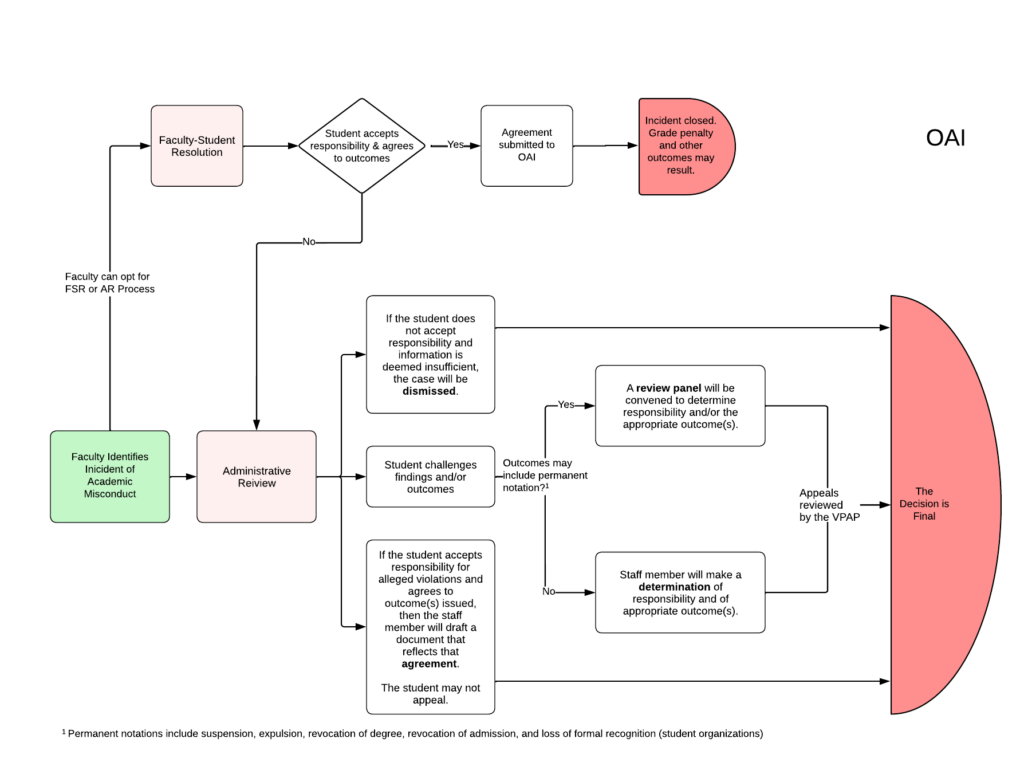Process
Flow Chart

USC empowers and expects its faculty to respond to all suspected acts of academic dishonesty that occur in their courses. If an instructor has reason to believe, based on observation or other information, that a student has violated the university’s academic integrity standards, the instructor is expected to submit a report to the Office of Academic Integrity.
Some allegations of academic dishonesty may be resolved informally between a faculty and student through a Faculty-Student Resolution (FSR), while others will be resolved through the formal, Administrative Review process.
Faculty-Student Resolution
The FSR permits instructors to resolve academic dishonesty directly with a student if the following criteria are met:
- The student accepts responsibility for the allegation (and the instructor’s proposed resolution);
- The alleged behavior is deemed appropriate by OAI for resolution between the instructor and student; and
- The student has not previously been held accountable for academic dishonesty through an FSR or through OAI.
An FSR form is completed and signed by the faculty and student involved and then submitted to OAI.
Administrative Review
Incidents reported to OAI and not resolved through an FSR will be reviewed through the Administrative Review process. OAI will send notice to the student involved (via USC email). The instructor on record will also be copied on the notification to the student.
The student will be invited to meet with OAI staff to discuss the incident, answer questions, and provide their perspective of what occurred.
If it is determined that there exists insufficient information to conclude that the student violated university policy by a preponderance of the evidence (i.e., what is more likely to have occurred) standard, then the case will be dismissed with no findings or outcomes issued.
If the student accepts responsibility for the allegations, OAI staff may seek to reach an agreement with the student during the administrative review as to appropriate outcomes. If an agreement is reached (i.e., the student accepts responsibility for the alleged violations and the outcomes proposed by OAI staff), the matter is considered resolved and no appeal is available.
If the student challenges either the findings of responsibility and/or the outcomes proposed by OAI staff, the next steps are dependent on the possible outcomes proposed by OAI staff.
If an outcome could include suspension, expulsion, revocation of admission, or revocation of degree, OAI staff will refer the matter to a review panel for its determination of responsibility and outcomes. The student’s previous disciplinary record will be considered in determining appropriate outcomes and the student retains their ability to appeal the decision issued.
If there is no potential outcome of suspension, expulsion, revocation of admission, or revocation of degree, OAI staff will use a preponderance of evidence standard to determine if the student is responsible for the allegation(s). (There is no option for a review panel.) If so, OAI staff will determine the appropriate outcomes with consideration of the student’s previous disciplinary record (if any). The student may submit an appeal.
Review Panel
Review Panels consist of three to five members, designated by the Vice Provost for Academic Programs or designee, comprised of any combination of faculty, staff, and students, to consider the report/documentation and to hear from/ask questions in real time of the student, instructor (if available) and any relevant identified parties. The review panel shall determine by a preponderance of evidence standard if the student is responsible for the alleged violation, and, if applicable, outcomes.
Appeals
Appeals are documentary reviews determined solely on the merits of the student’s submission. Appeals do not include an in-person or virtual presentation. Therefore, written submissions should be as complete as possible and no longer than five single-spaced typed pages with a font no smaller than a size of 10 point.
Appeals are permitted by the student on one or more of the following grounds:
- New information that is sufficient to alter the determination of responsibility, and which the student/organization was not aware of or could not have reasonably obtained at the time of the initial review.
- Procedural error(s) that materially impacted the determination of responsibility. (Procedural or technical irregularities will not be sufficient to sustain an appeal unless found to have affected the determination of responsibility.)
- The outcome(s) assigned is (are) disproportionate to the determination of responsibility.
The Vice Provost for Academic Programs or designee will consider the written appeal and information/documents considered in the review and provide a written decision to the student and OAI. The Vice Provost for Academic Programs or designee may uphold the initial decision in its entirety, send the case back to OAI for further review, reverse a finding of responsibility, modify the outcome(s), or dismiss the case. This decision is final and binding and there is no further avenue for appeal.
